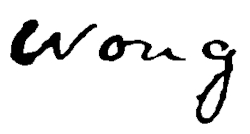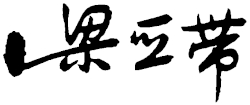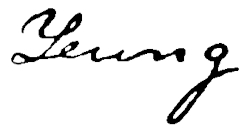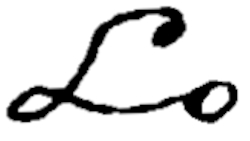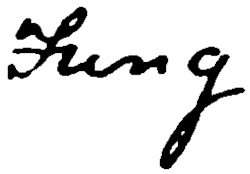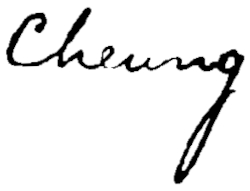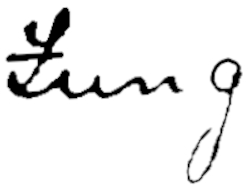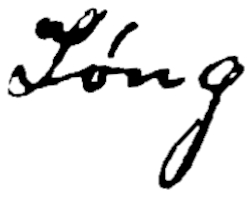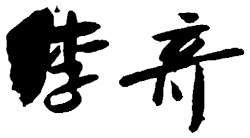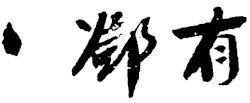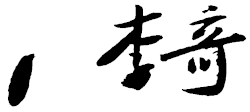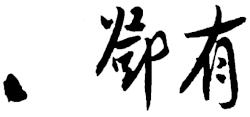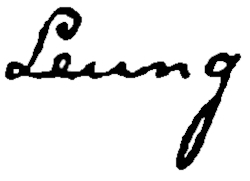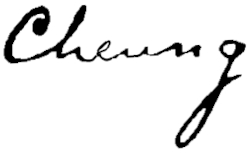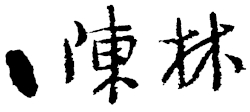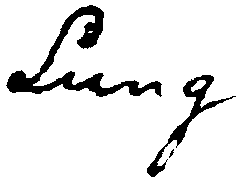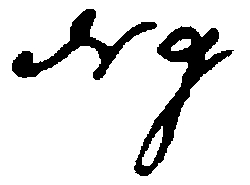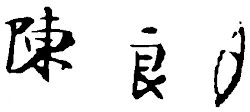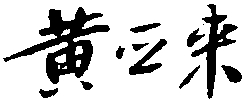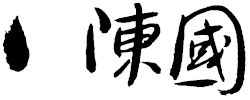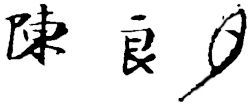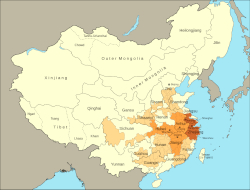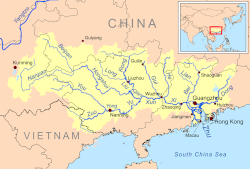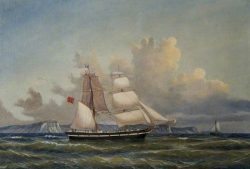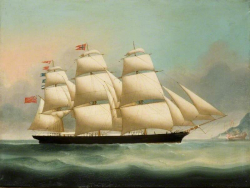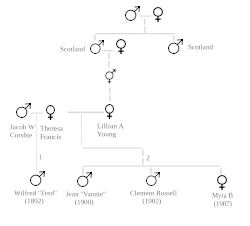Documents of Chinese Immigrants
Source: Diannne Corsbie The Archive Library in Trinidad in 2013.
Table of Contents
Original Documents
Modified Documents
Signatures on the Documents
Transcriptions
Canadian House of Commons: Clement Russel "Rus" Corsbie
Original Images
| Person 1: | Cheung aping | |
|---|---|---|
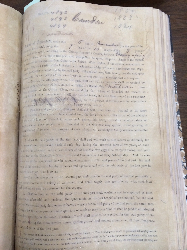 Page 1 |
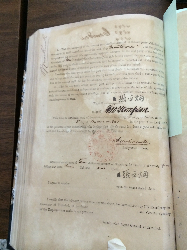 Page 2 |
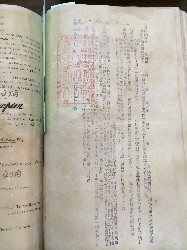 Page 3 |
| Note: The first three pages listed above are a template for all persons listed here. To view all the original images, click complete set. | ||
Modified Documents
| Person 1: | Cheung aping | |
|---|---|---|
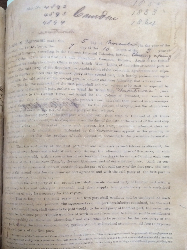 Page 1 |
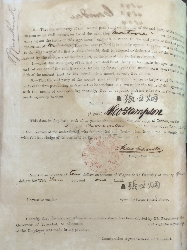 Page 2 |
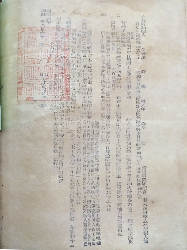 Page 3 |
| Note: To view all the modified images, click complete set. | ||
Signatures on the Documents
| Agent of the British Government for Emigration | Emigration Officer |
|---|---|
 |  |
| Theophilus Sampson | Emigration Officer |
___
| Person 22 | ||
|---|---|---|
| Ship: Montrose/Red Riding Hood | ||
| Date: November, 30, 1865 | ||
 Li Hoak Li Hoak | ||
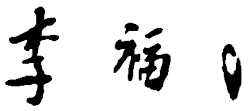 Signature 22a | ||
| Signature 22b (Missing) | ||
 Wife: Li Iong | ||
| Child: One |
Note: It appears that these documents describe 22 families that emigrated from China to Trinidad. They all list a wife and one child (or infant). Also, Montrose is listed as the sailing ship; however, at the top of each page is the name of a separate ship—Camden, Golconda, Glinroy, etc.—with ship numbers. It is possible that these individuals came over on these ships rather than the Montrose. An alternate explanation is that they departed from China on one ship and arrived on another, which was annotated at the top of the page.
Transcriptions
Person 1
Articles of Agreement, made this 5 day of November, in the year of the Christian Era 1864, being the 7 day of the 10 month of the 3 year of the reign of Tungehi, according to the Chinese Imperial Calendar, between Cheung asaing (?), native of China, of the one or first part, and Theophilus Sampson, Esquire, Agent of the British Government for Emigration from China to the British West Indies, of the other or second part, as follows.—The said party of the first part, in consideration of the covenants, agreements and stipulations hereinafter entered into by the said party of the second part, doth hereby promise and agree to and with the said party of the second part, in manner and form following, that is to say:— 1.—That he, the said party of the first part, shall and will, so soon as he shall be required by the said party of the second part, embark on board the British Ship “Montrose”, now lying at anchor in the Canton River, and bound for the Colony of Trinidad, and remain on board the said ship thenceforward until she proceed to sea, and shall then proceed as a passenger on board the said ship to Trinidad aforesaid, for the purpose of carrying out the stipulations hereafter contained on the part of the said party of the first part. 2.—That the said party of the first part shall and will, from time to time and at all times during the term of five years, to be computed from the day of the date of the arrival of the said ship in the said colony of Trinidad, serve such person, his heirs, executors, administrators or assigns, and on such plantation in Trinidad as the Governor may appoint, in the growing or manufacturing of articles the produce of such plantation, according to the provisions hereinafter contained. 3.—That the said party of the first part shall and will work as such laborer as aforesaid, for the space of seven hours and a half of each day during the aforesaid term of five years, on such plantation as aforesaid, with a reservation of not less than five days to be set apart during each year as holidays at the China New Year, bu the said Governor, and of every Sabbath day. And in consideration of the agreement herein contained on the part of the said party of the first part, the said party of the second part hereby promises and agrees to and with the said party of the first part in manner following, that is to say:— 4.—That the said party of the second part shall provide the said party of the first part with a free passage to the said colony of Trinidad, and shall supply him gratuitously with such food and clothing as may be necessary for the voyage. 5.—That so long as the said party of the first part shall continue and be employed as such labourer, as aforesaid, and perform the agreements on his part hereinbefore contained, he, the said party of the second part, shall cause to be paid weekly to the said party of the first part, the same rate of wages for the same proportionate quantity of work as may from time to time be paid to unindented labourers working on the same plantation,* and shall cause to be provided for the said party of the first part, during the same service, house, garden ground and medical attendance, all free of expense to the said party of the first part. 6.—That the said party of the second part shall on demand of the said party of the first part so soon as he shall embark on board the said ship Montrose, for the purpose of carrying out the terms of this agreement, make an advance to the said party of the first part to the extent of ten dollars, Provided always, and it is hereby agreed, that any sum so advanced to the said party of the first part as aforesaid, shall be stopped or deducted out of the wages to be earned by the said party of the first part, at the rate of one Dollar per month. 7.—That the said party of the first part shall be at liberty to terminate this agreement at the end of any one of the said five years, by paying for each year than unexpired a sum equal to one-fifth of the amount paid for his introduction, namely seventy-five dollars. 8.—That the said party of the second part shall provide or cause to be provided for the said party of the first part during such period as he continues to serve under the terms of this agreement, with the means of corresponding monthly, free of expense, with his relatives in china, and of remitting money to them.
This done in duplicate, each of the parties aforesaid retaining one copy, at Canton, on the 5 day of November, in the year of our Lord 1864 in the presence of the undersigned, who declares that this Contract has been signed willingly, and with full knowledge of its contents, by the said party of the first part.
Received an advance of ten dollars on account of Wages, and a Gratuity of twenty five dollars for Wife Yam (?) Shi, and one Child.
I agree to employ {blank} upon the terms stated above. I certify that the labourer, whose name appears above, has been allotted by His Excellency the Governor of Trinidad, to plantation {blank}; and that the signature of the Employer was made in my presence.
——— * Resolution of the Governor and Court of Policy of British Guiana—“That the immigrants should be guaranteed full employment on (?) wages, paid weekly, with a house rent free: with medical attendance, medicines, food and hospital accommodation when sick; and that it (?) should be explained to them that a man can earn easily from 2 to 4 shillings, women from 1 to 2 shillings, and children 8 pence per diem, and that a (?) supply of food for a man and be bought for 8 pence per item.” ——— NotesThe above transcription describes each page in the immigration document. Where indicated in the scanned documents by the underlined sections, each immigrant has their name written by hand by the immigration officer. Tungehi: a term I could not find on the internet. However, I looked up the Chinese calendar during the 19th century. From 6/6/1864 to 11/18/1964 was during the Era “Taiping Tianguo” in the Reign of “Hong Tianguifu.” This was during the “Taiping Heavenly Kingdom” from 1851 to 1864 AD. It was associated with the Taiping Rebellion which overthrew the Qing dynasty. Taiping controlled southern China, about 30 million people at the time. The combined forces of the Qing, the French and the British overthrew eventually control from the Taiping. It is possible that “Tungehi” is an anglicized version of “Tainguifu.” Hong Xiuquan controlled Taiping but died in June 1864 during the fighting; however, his forces fought until 1871. Hong Xiuquan’s son, Hong Tianguifu, took command of the Taiping forces, which is why this reign uses the name “Tianguifu.” Link: https://en.wikipedia.org/wiki/List_of_Chinese_monarchs... Canton River: known by many names—Pearl River, Zhujiang, Zhu Jiang, Chu Kiang—is a large river in southern China. It is the 3rd largest river in China, running 2,400 km and drains the Guangdong and Guangxi provinces. Hong Kong lies at its mouth. It is possible that Jacob Walter Corsbie comes from the Hong Kong region, since Hong Kong was a member of the British Commonwealth. Also, this would be consistent with the Taiping discussion noted above, which ruled southern China. Link: https://en.wikipedia.org/wiki/Pearl_River Brig Montrose: I found a reference to the Brig Montrose which sailed from Cuba to New York City in 1868. It is possible that this same sailing ship was used four years earlier to sail from China to Trinidad?. Link: https://immigrantships.net/ships/montrose.html
I found a reference for the SS Golconda (1863): link Ship Red Riding Hood: I found a reference to a British sailing ship, the 'Red Riding Hood of London.' This appears to be a three-masted ship. Perhaps person 20 sailed on this ship, there is a reference to 'Red Riding Hood' on page 2. Link: https://artuk.org/discover/artworks/red-riding-hood-of-london-2914 |
Canadian House of Commons: Clement Russel "Rus" Corsbie
IMMIGRATION REGULATIONS.Mr. MACDONALD moved: For a copy of all letters, telegrams and other documents relative to the exclusion at St. John, N.B., from Canada, of Mr. Corsbie, son of Jacob Corsbie, of Trinidad, a British, subject, on the alleged ground of his being of Chinese extraction, and in regard to the deportation of said Corsbie. He said: Mr. Speaker, I am making this motion for the purpose of calling attention of the House to what I think was very objectionable and ill-considered treatment of a young man belonging to the Island of Trinidad and who was endeavouring to come to Canada in the month of August, 1916, for the purpose of being educated. The circumstances in connection with the matter have received a great deal of attention in that sister Dominion of ours and have caused a great deal of ill-feeling. For a number of years the Presbyterian body in Canada have maintained an organization in Trinidad. The matter was brought to my notice and I have been asked to call the attention of the House to it by representatives of the church resident in the Island of Trinidad. The circumstances will be explained perhaps more clearly in the correspondence which I will read than if I attempted to state them. First, I will read from a letter written by the Rev. Dr. Coffin, formerly of Prince Edward Island, but who is now located at San Fernando, Trinidad. He writes on October 14 to a friend of his, a clergyman, in the province of Nova Scotia, as follows: San Fernando, Trinidad. October 13, 1916. Dear Mr. Thomson: I am enclosing you a statement from Jacob Corsbie in regard to his son. His statement will explain the case. His return has caused a great amount of talk and bad feeling. Personally, I do not believe that he was treated fairly, but according to a rule of thumb method of interpreting the Immigration Act. Canadians can hardly be respected abroad if this is a sample of our laws and their working. The boy was harshly treated after the manner of a criminal. His brother in Halifax could not see him except under escort of police. His father as you knew is our representative elder and has a seat if elected in the Canadian General Assembly. Just think of him going up an being treated as a criminal practically. The boy does not know a word of Chinese and is a westerner to all intents and purposes, with almost as much Scotch blood in him as Chinese and in every other respect much more Scotch than Chinese. With all good wishes. Yours, &c., F. J. Coffin. He encloses a letter written by Mr. Corsbie, father of the young man, which is as follows: Prince of Wales Street, Dear Sir,— In reference to our conversation relative to my son, I now write you and ask you to interest yourself in the matter, as I consider this treatment was very unjust to a British subject, and for this purpose I give you the following facts: 1, On the 19th August last, my son, Clement Russell Corsbie, age 14, sailed by the Royal Mail SS. Caraquet for Halifax, N.S., Canada, and has come back yesterday by the same steamer, as the Canadian Government forbade his landing. {Note: I have the birthdate of Clement Russell Corsbie on 11/5/1907, which would make him 9 years old, not 14! Perhaps my birthdate is wrong?} 2. I came to Trinidad from China in my childhood, and have lived here for over 50 years, formerly as a teacher in connection with the Canadian Mission here, then as bailiff and commissioner of assessments for the borough of San Fernando, and latterly as a Peasant Cocoa proprietor. {Note: I have the birthdate of Jacob Walter corsbie on 07/6/1856, which would make him 8 years old in 1864, when he arrived to Trinidad, and 60 years old in 1916, consistent with this letter.} 3. I received part of my education in Canada at the Galt Collegiate Institute. Ontario, under the late Dr. William Tassie, M.A., LL.D. 4. My wife, the mother of the boy, is a creole of the Island (coloured, not black), and her ancestors for generations have been British subjects. Her grandfather was a Scotchman from Scotland. 5. My son was educated at the Canadian Presbyterian Mission School, San Fernando and his object in going to Canada was to further his studies under his brother Wilfred (Fred) Corsbie, druggist with E. M. Macleod, Esq., of Halifax, N.S., who has been so employed for the past 8 years. {Note: Wilfred C "Fred" Corsbie, born 04/7/1892, was a half-brother: they share the same father, Jacob Walter Corsbie; however, Fred's mother was Theresa Francis, not the "creole" women mentioned here, who I assume is Lillian A Young.} 6. My son had with him a passport from the Government of this colony, stating and certifying that he was a British subject, and required in the name of His Majesty all those whom it may concern to allow Clement Russell Corsbie to pass freely without let or hindrance, and to afford him every assistance and protection of which he may stand in need. Signed by "J. R. Chancellor, R.E., K.C.M.G., D.S.O.", the Governor of the colony, on the 16th day of August, 1916. 7. In the face of this, the Canadian Government flatly declined to admit him unless he deposited £100, and as he and his brother had not this amount, he was ... transported, and I had to stand the expenses of his being sent back. [Mr. Macdonald.] I venture to assert that this is a case of extreme hardship and unjust treatment to a British subject, for my son is a born British subject, and the object he had in view was education. Before leaving here he a complied with all the regulations and requirements. He was going there to be with his brother, who is employed and who would help to maintain him, and my intension was to remit an allowance regularly for his maintenance so he would not be under any charge to the Government there. Canada claims to be very anxious to promote {a} closer relationship with the West Indies, and to aid in this a trade preference exists between us, but these efforts are wholly offset if the treatment above described is to be meted out to His Majesty's subjects from the West Indies. Thanking you in anticipation for your kind assistance. I am Yours faithfully, J. W. Corsbie. The boy’s mother’s relatives are a well known and distinguished family of West Indians. One of them is a solicitor, who occupies a high position in his profession. When this young man arrived at St. John the Government detained him on the ground that he was of Chinese origin. The Rev. Mr. Morton, who was at one time a prominent Presbyterian minister in Trinidad, happened to he in St. John at the time, and obtained the good offices of a gentleman who is well known to my hon. friend the Minister of Trade and Commerce (Sir George Foster). I refer to Judge Forbes. These two gentlemen, I am informed, laid before the Government the facts of the case, which has created a very bad feeling, not only in the island, as shown by these letters and certain other evidence that has come to our people in Nova Scotia, but the subject has also been discussed at very great length in the Presbyterian Church in Nova Scotia generally and with considerable energy in the Presbyterian papers of the province. I know that the statute is not very broad with reference to the exclusion of persons of Chinese origin, but it does seem to me that in a case like this, where the young man was highly spoken of, there should be such an interpretation of the Act as would avoid such a situation as has occurred. There are certain exemptions from the operations of the Chinese Exclusion Act, which was passed at a time when the feeling in this country in regard to the entry of Chinese was very much stronger than it is now. The exemptions include: (a) Members of diplomatic staff, consuls and their a servants. (b) The children born in Canada of parents of Chinese origin and who have left Canada for education or other purposes on substantiating their identity to the satisfaction of the controller of the port or place where they seek to enter on their return. (c) 1. Merchants, their wives and minor children. In this particular case this young man is a minor, the son of a merchant in Trinidad. This Chinese Exclusion Act was manifestly intended to exclude those who are not included in the list of exceptions I have read. It was not intended to exclude such a person as young Corsbie. I am not going to argue whether the Government were acting on the strict letter of the law or not. This young man, according to the strict letter of the law, may possibly be subject to exclusion. But I submit that it was quite within the power of the department, more particularly as power had been given to pass orders in council dealing with certain classes of people whom it was thought desirable to exclude, to have allowed this young man to come into the country, as his identity had been vouched for and his character and status commended to the Government by the gentleman I have mentioned. I think the Government should have had regard to those facts, and should now formally express regret to the Governor of Trinidad for the mistake which they made in excluding this young man, and express their willingness to provide for his admission. One class that are exempt from the operation of the Chinese Immigration Act, subject to regulations made from time to time by the Governor in Council, are duly certified teachers. Now this young man is the son of a teacher, a Canadian graduate. One can well understand what a very real and injurious blow must have been struck at the good feeling which we are so anxious to maintain and develop with our British fellow-citizens in Trinidad, who naturally look to us, as we would desire them to look, in matters of trade and intimacy of all kinds, rather than to the United States—what a deterrent to that good feeling must have arisen when the word reached them that this young man was not allowed to enter Canada to complete his education. The facts that have come to me are from a source that is unquestioned, and I think the Government, now they are brought to their attention, should at once provide for the admission of this young gentleman. I want to say a word or two generally with reference to the law excluding Chinese. In the United States, at their great universities, one finds quite a number of Chinese who have gone there from China to complete their education, and that ought to be our policy in this country. If the Act, and the regulations made under the Act, are not sufficiently wide to admit these people from China who wish to come here to complete their educational training they should be amended so that there would be no question about the admission of Chinese coming here for that purpose. I have brought the case of this young man to the attention of the House at the request of some very well-known clergymen in the province of Nova Scotia, who have been connected with the Island of Trinidad. The facts are as I have stated, and unless the department has other information justifying their course in this case I submit that some action should be taken by the Government, in order to remove the bad impression which unquestionably exists and will continue to exist in Trinidad in regard to the treatment of this young man. *** Hon. W. J. ROCHE (Minister of the Interior): This case has been dealt with departmentally. Although I am not conversant with all the facts, I had a short memorandum placed in my hands this morning regarding the motion of my hon. friend. I think some of the statements in the correspondence which he has read are grossly exaggerated. When all the facts are brought down I do not think they will substantiate the statements that were read, that this young man has been treated like a criminal. I cannot quite take the hon. gentleman's view that, because certain respectable gentlemen had vouched for this young man and asked for his admission, the Government should therefore have acceded to their request. We frequently get very strong letters asking us to admit certain people who would be barred by the Immigration Act. In regard to this particular case, the reason why this young man was excluded by the officials of the department was that, according to their interpretation of the Act, he did not come within the exemptions. He was of Chinese origin and therefore was excluded under the Chinese Immigration Act. I will read the short memorandum dealing with this question supplied to me by the Superintendent of Immigration: Clement Russell Corsbie arrived at St. John, N.B., in September, 1918. While of British nationality, he is of Chinese descent and, not belonging to the exempt classes, could have been legally admitted only upon payment of the $150 head tax. Representations were made to the department by a large number of persons, but as there is no provision in the Chinese Immigration Act for any departure from the terms of same, the department took the stand that admission could be only upon payment of the $500 head tax, and as Corsbie was unable to pay, he was deported. Objection to the department's action was made by his father and a rather severe criticism was made in the Presbyterian Witness, published at Halifax. It was pointed out to this paper that in their views they should criticize the law, not the administration of the law. (Sgd.) W. D. Scott. That is the only report that has been placed in my hands. I may say that there has been some correspondence with the Governor of Trinidad and a courteous letter was sent to him pointing out that owing to the Chinese Immigration Act this young man was refused admission. I quite agree with the hon. member for Pictou (Mr. Macdonald) that the admission of young Chinese students into the United States under their immigration law for the purpose of attending any of their Universities is more liberal than our law in Canada has been up to the present time. For the last two years I have been discussing the question with those who have brought the matter to my attention, and I have already prepared an amendment to the Chinese Immigration Act to be submitted this session, to place the admission of these young Chinese students who desire to attend our schools and colleges, on the same footing as in the United States. This was a case where the young man, according to the interpretation of the officials of the department, did not come under any of the exempt classes, and as he did not have the $500 head tax, he was not admitted. Had he paid the $500 head tax, he would have been admitted and he could have attended any of our universities for one year, and on leaving the country afterwards he would have had that head tax refunded. We do that right along. Any young man of Chinese origin who comes to Canada and attends our universities pays the head tax upon admission, and when he leaves the country, the head tax is refunded. That is the difference between the United States law and ours. The United States do not impose the head tax. [Mr. Roche.] Mr. PUGSLEY: Is the wording in the Chinese Immigration Act: “Of Chinese origin"? Mr. ROCHE: I have not the Act here. Mr. PUGSLEY: Would not that mean a man born in China, originating in China? The son of a man who has been a British subject for fifty years is surely not of Chinese origin. Mr. ROCHE: The Superintendent of Immigration uses the expression "of Chinese descent". The interpretation which the department has placed on the matter—and I think the matter has engaged the particular attention of the department—is that he did not come within any of the exempt classes. That may be wrong and I will have the matter looked into more critically, but I feel sure that no similar case will arise in the future. The Act has not been changed since this Government came into power; this is the manner in which the Act has been administered since it was placed upon the Statute-book, and the same officials are still administering the Act. I quite agree, however, that the Act should be amended and, as I stated before, I have prepared an amendment to be submitted this session. Mr. PUGSLEY: I think the word in the Act is “origin,” and that must mean a man who has been born in China, who is a Chinaman. If the minister is sound in his views, then a man whose great-grandfather happened to be a Chinaman and whose blood might be only about one-tenth Chinese, would be excluded. The Statute surely cannot mean that. In this case the boy was the son of a British subject, a man who had left China when a boy, who had lived in a British colony and who had become a British subject. This boy is a British subject; his brother is not a Chinese woman, and his mother's blood must count in considering the question. If the word is “origin,” as the minister seems to think it is, it is clear that this boy ought to have been admitted. { In the discussion above, assuming the father were Chinese and no other progenitors are of Chinese "blood", then the great grand-child would be ⅛th Chinese, not 1/10th: Father (1) → Son (½) → Grand Son (¼) → Great Grand-Son (⅛). In this case, the father was Jacob Walter and the son was Clement Russell, who was ½ Chinese. } Mr. MACDONALD: The statements that I made in regard to this matter were not comments by myself with reference to anything that occurred at St. John, but were contained in letters which came from Trinidad, and the mention of the manner in which the young man was treated was contained in a letter from the boy's father. On account of the situation of the library it is difficult to get books outside of those in general use, but my recollection of the Statute is that a person excluded is a person of Chinese origin, and it seems to me a very fine distinction, when you are dealing with a British subject coming from Trinidad, whose status has been certified to by the Government of that colony, to put him within the terms of the Statute. I would like to know what interpretation would be put upon the right to enter Canada of a person for instance, who had been born of a British father but whose mother happened to be born in China, and who therefore had some Chinese blood in him. Could he be excluded under that Statute? He could not be, and if you reverse that condition I think that the same reasoning would apply. { From a political point of view, he claims that women do not hold equal status: that only a man is considered under the Statute as if the woman were an object, a mere suitcase. He uses this to his advantage to point out the contradiction and absurdity of the law, but at the same time emphasizes the paternalistic and misogynous culture in the early 1800s. From a genetics point of view, whether the father or the mother were Chinese, and the opposing spouse were Caucasian, the boy would be still ½ Chinese. Therefore, if mathematics were the issue, then this discussion becomes equally absurd. } I am glad to hear that the minister recognizes that the law requires to be amended. I would suggest, in order to avoid the feeling of resentment which this matter has caused in Trinidad, on account of the notoriety that hae been given to this case, that steps be taken to satisfy the authorities there, in so far as it is possible to do so, as to the regret this country has over the exclusion that has been made. Motion agreed to. On the motion of Sir George Foster for the adjournment of the House: ...Motion agreed to, and House adjourned at 5.15 p.m. |










